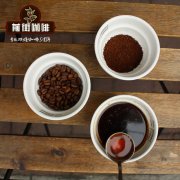How do you drink Costa Rican coffee? what are the recommendations of Costa Rican coffee brands?

Professional coffee knowledge exchange more coffee bean information please follow the coffee workshop (Wechat official account cafe_style)
Introduction of Costa Rican Coffee Brand
The fertile volcanic mud soil in Costa Rica is cultivated with rich multi-level sweetness. 100% Arabica beans have a slightly acidity, full taste, rich sweetness and rich and varied taste experience.
Coffee beans feature:
The quality of our coffee is directly combined with the geographical characteristics of the country of origin, as well as the rigorous and painstaking process of producers from farm production, processing, drying, baking, packaging to sales preparation. Most of the products are moderately roasted, and moderately roasted coffee is moderately brown and brighter than lightly roasted coffee. Like lightly roasted coffee, there is no oil on the surface of coffee beans. However, moderately roasted coffee will not have the grassy flavor of lightly roasted coffee, but will show a more balanced flavor, aroma and acidity.
The best coffee in Costa Rica is produced by small processing plants distributed in major coffee producing areas, including Tarrazu and the West River Valley. The coffee revolution that began 15 years ago has greatly changed the view of Costa Rican coffee roasters and importers. Take the processing plant as the center, collect coffee beans from nearby farms for processing. Most of these farms are cultivated by small communities or families on their own land. The coffee produced by these farms can be processed and dried by processing plants. The unique quality and flavor of Royal Coffee is mainly due to the cooperation between coffee growers and our company. St. Rome's processing plant uses water washing method, which is famous for producing coffee with rich flavor, rich taste and thick texture. Through the handpicking of coffee cherries, coffee farmers can remove ripe or immature cherries before processing. Depulper is used to remove the skin and flesh of coffee beans, and then another machine classifies coffee beans as level 3. Legumes classified as grade 1 and 2 will be separated and fermented, while grade 3 beans are considered to be inferior. Raw coffee beans will be placed in a cool and cool place to ferment for 24-36 hours. After fermentation, beans will be cleaned and sorted using water channels according to their density. Then the coffee beans are soaked in water for the night.
Hummingbird
Located in the southwest of Costa Rica, the Tarrazu region has a volcano, the Agua volcano Irazu, near and facing the sea. This unique microclimate and fertile volcanic soil, as well as good climate, sunshine and humidity, are conducive to the growth of perfect red coffee cherries. In the production process, weeding is done by hand, and the environmentally friendly planting technology does not involve the use of chemical fertilizers and pesticides. Coffee produced in this way has a strong flavor, strong aroma, full thickness, moderate acidity and a delicate finish of nuts, spices and licorice. The harvest of ripe, red cherries is done by hand and tightly controlled. During the processing process, washing, fermentation and sun-drying are carried out in the processing plant. The coffee beans are then sent to an African drying bed for further drying until the overall water content is the same. Then the beans are shelled and exported. This is the latest drying process, 0-10% of the pulp and mucus are maintained. After a little fermentation and about 25 days of natural drying, this process will highlight the fine technology and local characteristics of the Costa Rican microprocessing plant. Fermentation is maintained at an appropriate level to ensure the perfect balance between clarity and complexity of coffee.
Important Notice :
前街咖啡 FrontStreet Coffee has moved to new addredd:
FrontStreet Coffee Address: 315,Donghua East Road,GuangZhou
Tel:020 38364473
- Prev

Kenyan coffee beans are graded. How to get the best coffee in Kenya? what brand of coffee is good in Kenya?
Professional coffee knowledge exchange more coffee bean information please follow the coffee workshop (Wechat official account cafe_style) the Kenyan coffee brand grading system is set up under the policy of government-led management of quality and guidance to coffee farmers. After the coffee is harvested, the official unit set up by the government, the Kenya Coffee Bureau (Coffee Board of Kenya referred to as CBK), becomes
- Next

The History of Costa Rican Coffee will Costa Rican coffee be very fruity?
Professional coffee knowledge exchange more coffee bean information please follow the coffee workshop (Wechat official account cafe_style) what are the Costa Rican coffee brands? Coffee from Costa Rica has always been very popular with guests. I have thought about why she was able to break out of other individual coffees: one of the famous representatives of Central American coffee; besides the rich flavor and excellent quality of coffee
Related
- Detailed explanation of Jadeite planting Land in Panamanian Jadeite Manor introduction to the grading system of Jadeite competitive bidding, Red bid, Green bid and Rose Summer
- Story of Coffee planting in Brenka region of Costa Rica Stonehenge Manor anaerobic heavy honey treatment of flavor mouth
- What's on the barrel of Blue Mountain Coffee beans?
- Can American coffee also pull flowers? How to use hot American style to pull out a good-looking pattern?
- Can you make a cold extract with coffee beans? What is the right proportion for cold-extracted coffee formula?
- Indonesian PWN Gold Mandrine Coffee Origin Features Flavor How to Chong? Mandolin coffee is American.
- A brief introduction to the flavor characteristics of Brazilian yellow bourbon coffee beans
- What is the effect of different water quality on the flavor of cold-extracted coffee? What kind of water is best for brewing coffee?
- Why do you think of Rose Summer whenever you mention Panamanian coffee?
- Introduction to the characteristics of authentic blue mountain coffee bean producing areas? What is the CIB Coffee Authority in Jamaica?

